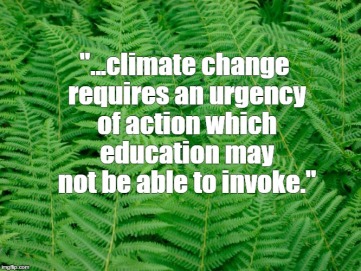When I moved from Mumbai to Boston this June, one of my biggest apprehensions was the brutal New England winter. However, there have been multiple “winter” weekends (including this past one) where I’ve been able to walk around sans jacket. And while this is great news for my cold-hating bones, I wonder if it’s yet another side-effect of much more sinister climate changes. According to NASA, two of the three warmest average January temperatures have been in the past two years.
Global warming, whatever the current administration may choose to say, is an undeniable fact. The question is not whether it will affect us, but rather what can we – as a world of different nations, as nations of millions of people – do to mitigate its effects?
In teaching, as in parenting, adults should remember to lead by example. Children will not practice what you preach, but what you do.
Similarly, there’s a strange tension between the developed world powers who seek to reduce greenhouse gas emissions post-industrialization, and developing countries who often believe they do not have the resources to develop without polluting the environment the way larger countries did.
Unfortunately, greenhouse gases stay in the atmosphere for ages. Emissions to date will already impact climate over the next several decades or even hundreds of years.
And yet, it’s one of those problems we refuse to tackle head-on because it’s too big, and too hard. Some choose to become ostriches, burying their heads, refusing to acknowledge the issue. Others push it to the back of their minds, because they have more pressing everyday concerns. Still others take small steps towards cutting their personal carbon footprint, but believe the larger commitments needs to come from larger players, like nations, industries, and other large pollutants.
I don’t know the balance between how much power lies with countries and world leaders, and how much change individuals can bring. But in the United States alone, each person produces ~50,000 pounds of carbon emissions in a year. And while there is a “floor” of roughly ~20,000 pounds of emission below which American citizens cannot dip with lifestyle changes, that still leaves 30,000 pounds a person a year as “room for improvement.”

While I generally believe education can more or less address any issue, climate change requires an urgency of action which education may not be able to invoke. Still, changing mindsets is a critical lever is achieving long-term change. Thus, while countries do need to dedicate resources and political will, they also need to make sure their science teachers are dedicating enough time and energy to the topic.
A recent Penn State paper found that most teachers spend an average of one to two hours discussing global warming in an entire year. Even when they teach, over 30 percent of the teachers surveyed provide misinformation to their students, claiming that recent climate change is “likely due to natural causes.” In general, the scientists were surprised by the “levels of ignorance the teachers showed”. Those are two words that should never be paired together – ignorance and teachers.
So while yes, this is a huge problem, and yes, education won’t solve all of it – to translate words into action, we need to reshape fundamental mindsets. I’ll even advocate speaking with money, for once, by investing in the right research and technology. Individuals need to move towards closing the 30,000 pound gap. Teachers need to educate themselves, and then their students. Larger countries need to lead by example, smaller countries need to be the bigger person and set their own, new standards. And, well – we probably need to hope a little, that things can get better, that we aren’t too late.
Disclaimer: Since this blog reflects only my reaction to a question regarding “How do we translate words into action”, if you’re interested in a succinct summary of climate change and its socioeconomic and political implications, check here.

[…] in addressing it. Educating younger generations will help enable changes needed for the future. In Kamna Kathuria’s article on climate change, she mentions a Penn State paper citing that teachers are spending on average […]